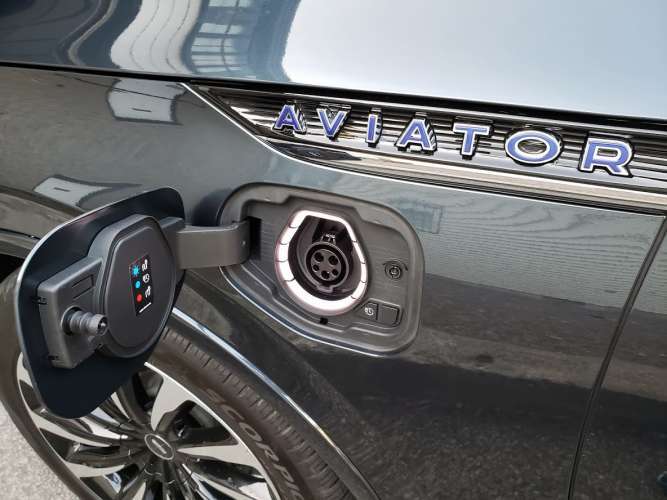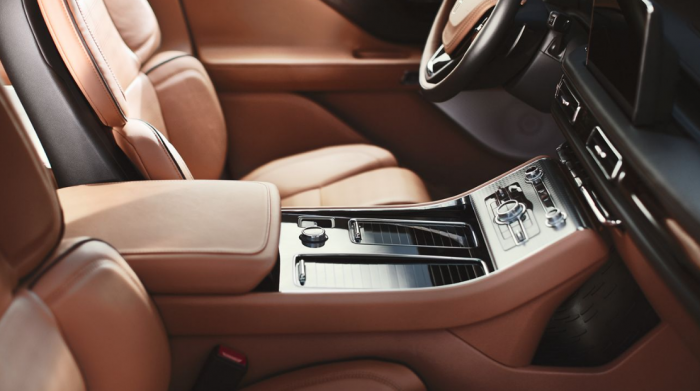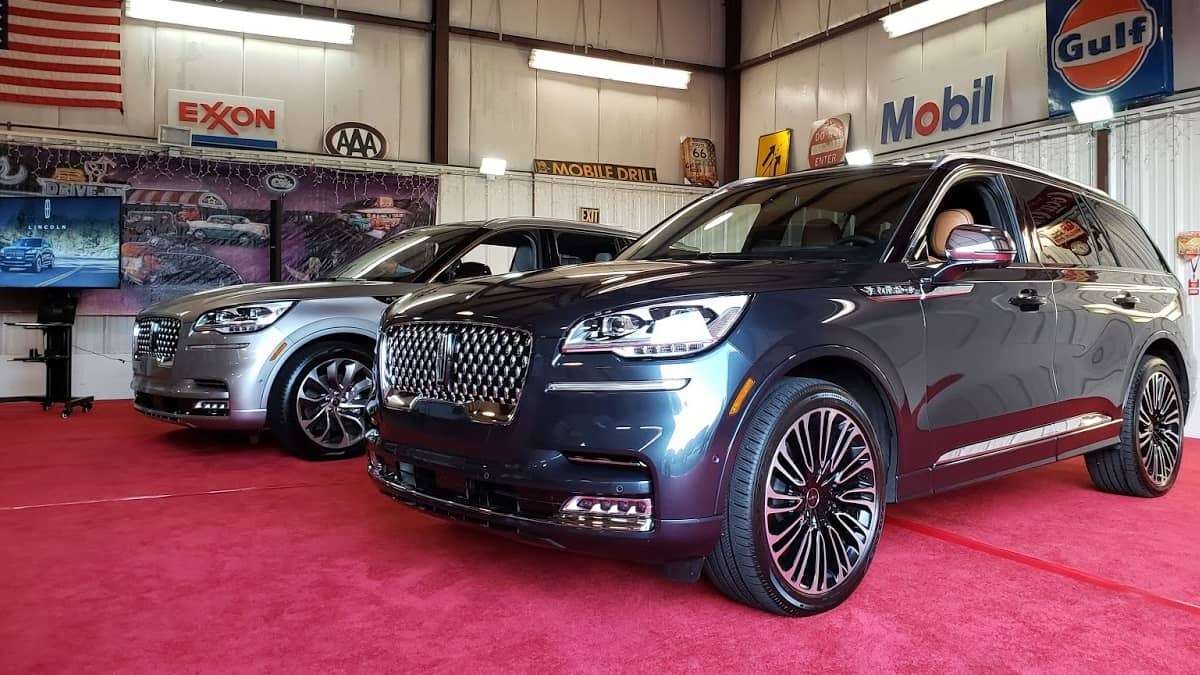The Lincoln Motor Company converged on the global headquarters of the New England Motor Press Association last night, a.k.a., Bugsy’s Garage. Lincoln brought out three executives and PR personnel to overview the significant transformation the company is undergoing. Lincoln also brought three new 2020 Aviators, including one model not yet released for sale. The packed media group was unanimous in its agreement that the new Aviator line is impressive. The most impressive trim may well be the Grand Touring Plug-In Hybrid.
 Lincoln Changes
Lincoln Changes
Lincoln is a company with a long history of creating outstanding vehicles. Over the past few decades, Lincoln’s prominence may have waned, but as of late, the company has clearly turned a corner. Sales leaped in August. Overall sales were up by double digits and individual models were up by as much as 33%. In other key luxury markets, Lincoln is also doing very well. What is most interesting about this is that Lincoln has only just started to revamp its product portfolio and marketing plan.
Lincoln now works with four guiding principles. They are Beauty, Gliding, Human, and Sanctuary. These attributes will guide the company’s product direction, and the new Aviator is a perfect example of how these principles can help to shape a vehicle.
Lincoln is also revamping its dealerships' facilities. Lincoln’s customers and other shoppers in the luxury CUV and sedan business want stand-alone dealerships that feel like special places. Hence, Lincoln and its dealers are changing the physical spaces at which Lincoln presents its portfolio of products. Lexus underwent a similar transformation, and the results were positive.
However, Lincoln knows that once a new customer is an owner, they don’t want to see that dealership again until it is time to shop for another vehicle. To that end, Lincoln is now offering pickup and delivery of Lincoln vehicles (purchased in the past couple of model years). A Lincoln associate arrives with a vehicle, picks up the owner’s vehicle and leaves a vehicle for the owner to drive. The owner’s vehicle is then returned once the service is complete. Over a quarter-million pick-up and deliveries have been completed thus far, and the dealers who have opted-in report positive results. Lincoln refers to this as “Giving back time” to owners. Tesla and Genesis both offer similar programs.
2020 Lincoln Aviator
The new Aviator is a roomy, three-row crossover utility vehicle built to satisfy the expectations of a luxury shopper. To our eye, the new Aviator certainly embodies the principle of “Beauty.” Although we only had a short ride in the new plug-in hybrid trim, it most definitely embodies the “Glide” and “Sanctuary” aspect of Lincoln’s new goals. The “Human” aspect refers to making the products real-world useful and eliminating clutter in the cabin that has no meaningful reason to be there. A full week of testing will help answer whether this goal is achieved, but the controls we did use while on our short drive such as the piano-key drive mode selectors and door-mounted seat controls all seemed very intuitive and natural to operate.
 Aviator Quick Facts
Aviator Quick Facts
We will dive more deeply into the Aviator when we test it, but the vehicle checks off a lot of boxes for its segment. It features a rear-drive architecture, air-ride suspension, the most standard power in its class, and the plug-in hybrid has an incredible 630 lb-feet of torque and just under 500 hp. All Aviators can tow over 5,000 pounds, some trims much more. All three trims have the same packaging, passenger space, cargo volume, and spare tire. The hybrid's battery and motor take away nothing from the space inside the vehicle. Lincoln has very carefully packaged the Aviator such that interior is roomy, but so too is cargo space. There is no compromise. This is not a high-volume segment, but it is a high-profit segment. Lincoln looks to have a very viable vehicle here. Initial sales indicate a 50% conquest rate with BMW and Mercedes customers topping of the list of brands from which new customers are coming to Lincoln.
About Those Lincoln Matthew McConaughey Advertisements
Lincoln is not planning a head-to-head battle with BMW, Mercedes, and Audi over whose luxury CUV has the best track times. That whole concept is now tired, silly, and juvenile. You will soon see a clever, well-made advertisement featuring actor Matthew McConaughey (True Detective, Dallas Buyers’ Club) that well illustrates how Lincoln sees its products breaking through the noise in this segment.
In addition to covering green vehicle topics, John Goreham covers safety, technology, and new vehicle news at Torque News. You can follow John on Twitter at @johngoreham.






Comments
I am happy that Lincoln has
Permalink
I am happy that Lincoln has finally come out with a full sized SUV plug-in hybrid. Unfortunately it is about 6 years too late. They should have come out with this vehicle back in 2013 when Ford released the Fusion and C-Max Energi PHEVs. For 2020 they should have announced their full commitment to a pure electric SUV, which would have been REAL news. I do not know about EV only range on this new beast, but I think that it will be between 15-18miles. And even though it starts just under $70K, t is easy to tick the boxes and option it to well over $100K! Now this is not out of line with the brands that Lincoln wants to compete against like BMW and Mercedes. I have to wonder however why you think that it's worth reviewing this pricey Lincoln, when you question why Porsche even exists or matters as a car company. The Lincoln models, and especially this huge PHEV are hardly cars for the masses. At least they are ahead of GM and Chrysler who have not even announced a luxury PHEV SUV or pickup yet.
I think you may have
Permalink
In reply to I am happy that Lincoln has by DeanMcManis (not verified)
I think you may have misinterpreted comments by me about Porsche in a different story or context. I understand why Porsche exists. It makes money for its shareholders. It makes its customers very happy. No more reason needed to my way of thinking. Whether Porsche matters depends on the context. Particularly since the company is a brand under VW's ownership. This story is not a review of a model but an overview of the Lincoln brand's changes and a preview of the new Aviator. I do hope to test and review the Aviator. Specifically the Grand Touring PHEV. Unlike the very few organizations that purchase the cars they review or evaluate (IIHS, Consumer Reports), TN has no limit to the brands and models we can test or cover as news. We will cover any automotive topic that a manufacturer wants covered if they provide the data, access, and test vehicles. We even cover a couple brands who don't offer any of those things. I enjoy covering green vehicle topics and the new aviator will be among the most petroleum efficient and cleanest vehicles in its class. I am guessing its MPGe will be about 75. It will be the greenest vehicle in the U.S. market with its range, capacities, and capabilities. But that is stuff for a later story. The premium/luxury large crossover segment is small, but Lincoln has been around for 112 years. And their media support is among the best in the business. So they are an easy brand to cover.
It will be interesting to see
Permalink
It will be interesting to see how you pitch the Aviator as being the cleanest in it's class with the Tesla Model X out there. Also the long range Model X has a 325mile EV range and 0-60 in 4.4 sec, with the Performance model clocking 0-60 in 2.7 sec. The Lincoln might be more plush, and have more toys and options, but again loaded up it will easily pass $100K. Mind you I like the new Aviator. Both it's styling and design, and I give Ford/Lincoln credit for building a big PHEV. But even though they are leading America's big 3 into a SUV EV world they are long overdue, and should be offering a full BEV version by now, and building a PHEV with about twice the EV range as this model. I do look forward to your next article on this model, but you can expect me to chime in afterwards with a counterpoint.
The Aviator and Model X are
Permalink
In reply to It will be interesting to see by DeanMcManis (not verified)
The Aviator and Model X are not direct competitors. The Model X is an AWD performance minivan. SUVs and CUVs (crossover utility vehicles) can carry things on their roof :) That's where the Utility part comes in. Minivans are egg-shaped people carriers with odd side doors. I respect your opinions on EVs and you are a step ahead of me in their adoption, but I don't understand the "Should be offering a BEV" thing. Nobody has ever shown the world a profitable BEV. The time will come, I hope. But the current battery technology is too limiting, too expensive, and to restricted for it to work today. PHEVs work now. Ford's electric motor sandwiched between the trans and engine is simple and cost-effective. The battery-pack is paid for by ZEV credits and consumer-facing tax credits. Ford will have BEVs when they can be produced profitably. Just like every automaker. For now, it offers owners a CUV that can also take them work or around town with zero local emissions. Like Volts, it means the family doesn't have to buy two cars. I enjoy and respect your counterpoints, so please keep them coming!
I contend that the Aviator
Permalink
I contend that the Aviator and Model X are indeed competitors. Not for all customers, but for most. I don't know when I have last seen a full sized SUV with something strapped on the roof, but even though some people like that feature, it is not a deal killer for many. Most of the big SUVs that I see are in my commute, and those aren't towing, or camping, or going off road, or packing items on their roof. Most of them that I see are commuting daily, with a single occupant (the driver). The PHEV Aviator is better than most of their big SUV competitors, but I still believe that Ford/Lincoln should already be offering a BEV version of their most inefficient vehicles. I contend that such a vehicle can be profitable, just not as profitable as rehashing older technology. The Cadillac Escalade is a good example of this outdated philosophy of putting short term profit first. They make upwards of $50K in profit off each Escalade sold, and you don't see Cadillac rushing to change their cash cows anytime soon. Still, GM has tasked Cadillac with being their EV "Vanguard" which was supposed to produce a BEV SUV in 2021, and a new EV Escalade in 2022. But government loosening of fuel economy and smog goals means that automakers may drag their feet like Chrysler (FCA) has done historically. Happily, competition breeds innovation. And the success of Tesla's Model 3 should extend into the upcoming Model Y CUV. And speaking of cleaner SUVs, Rivian also will be offering their R1S BEV SUV next year as a '21 model for a similar price to the Aviator. Both Tesla and Rivian seem to think that enough profit can be made off of BEV SUVs and pickups to support the business well, even if it is not bringing in the same windfall profits made by rehashing older gas/diesel technologies. And on some level Ford agrees because they invested heavily in Rivian. I do understand that the process to fully evolve vehicles to electrification will take time, but without good EV examples and incentives, change will be slower, and adoption will lag. So Kudos to Ford/Lincoln for making this step (along with the upcoming Mach-E) but it is still happening too slowly for me if they are planning to lead the industry.
Ford owns a half-billion
Permalink
In reply to I contend that the Aviator by DeanMcManis (not verified)
As you point out, Ford owns a half-billion dollars worth of Rivian. Maybe the reason that the Aviator is a PHEV and not a BEV isn't much of a mystery if you really think about it... April 2019; "Rivian today announced an equity investment of $500 million from Ford Motor Company. In addition to the investment, the companies have agreed to work together to develop an all-new, next-generation battery electric vehicle for Ford’s growing EV portfolio using Rivian’s skateboard platform."